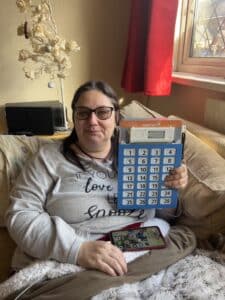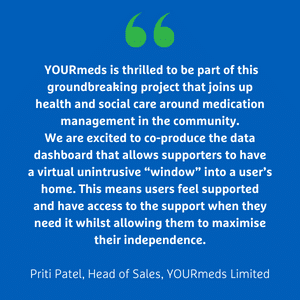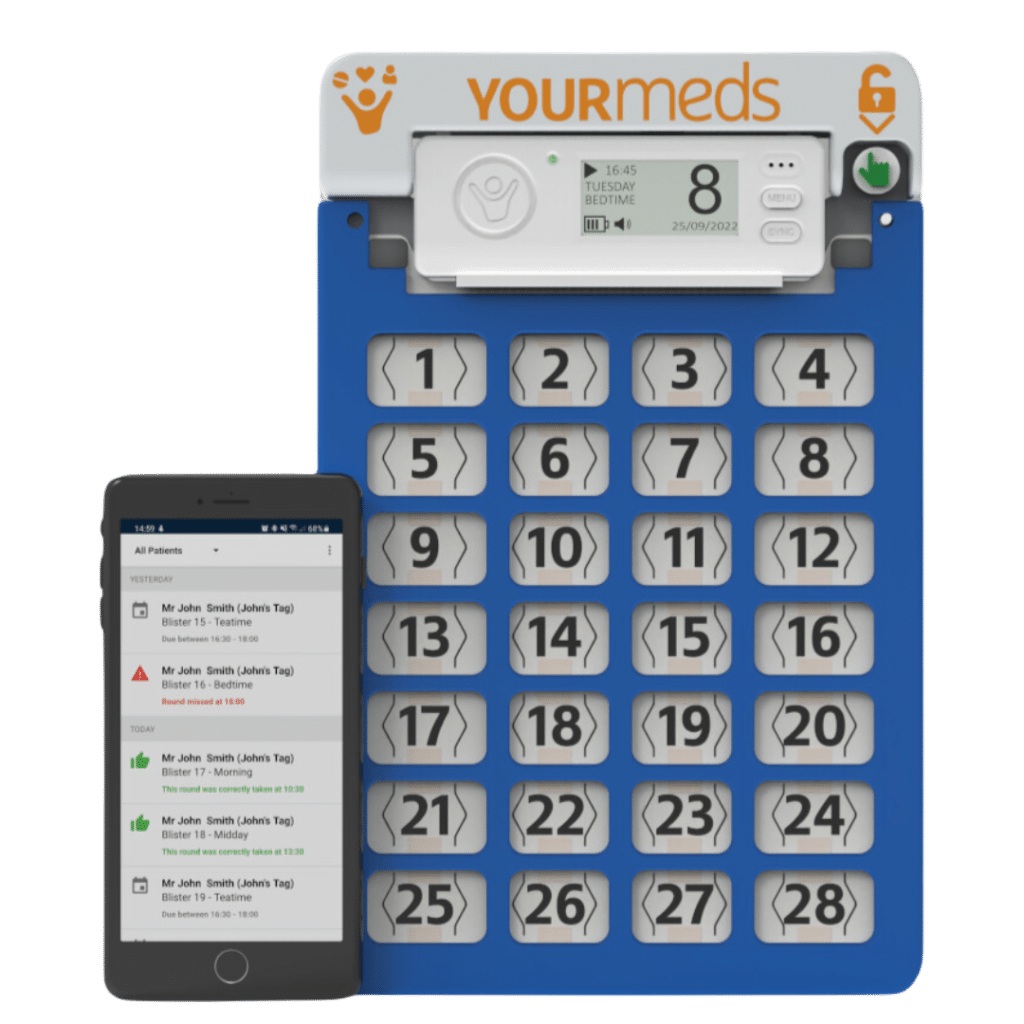Trialling Medication Management Devices in Bridgend
A Value-Based Health Care project with people covered by Cwm Taf Morgannwg University Health Board and Bridgend Local Authority is looking to trial a medication device and associated wraparound care to help people in Bridgend remain independent
The Growing Challenge of Medication Management
Increasing medication needs are a significant challenge in social care. Age UK estimates that almost two million people aged over 65 take at least seven different prescribed medications weekly. For anyone looking to maintain independence and live in their own home, managing medication is essential. But it’s estimated up to 50% of prescribed medicines are not taken as intended. A number of medication reminder devices are on the market to help people remember when to take their medications. One of the challenges with many of these devices is that they need to be refilled regularly – for example with a week’s supply of medication. This places a strain on families to support the process and can mean the device isn’t used if family members aren’t available at the right time. Another issue with many of the devices available is that they’re not digital, and therefore have no way of recording data that might help assess issues and trends.


Empowering People to Remain Independent
In Bridgend, the Pharmacy team and Bridgelink Telecare, both within the Community Resource Team, are working with Life Sciences Hub Wales to evaluate an innovative device that helps people remember to take their medication and allows the telecare team to offer greater support when needed.
During a previous trial of a device, Bridgelink Telecare and the Pharmacy team had worked together and seen the benefits of a medication device where community pharmacists were supported to supply pre-filled devices.
Following this trial, and with a newly refined requirements list, the two teams approached Life Sciences Hub Wales for project management support to evaluate a new device. Life Science Hub Wales’ horizon scanning confirmed YOURmeds as the best solution for the evaluation.
What is YOURmeds
YOURmeds device features a numbered blister pack that slides into a digital device called a tag. The blister pack is filled by community pharmacists and delivered to users, meaning families aren’t being called on to support this process. The digital tag alarms to reminds users when to take their medication and sensors in the blister pack detect when the medication has been accessed. If medication is missed, an alert can be sent to a family member and/or the alarm receiving centre.
A key benefit of the YOURmeds is that the device operates with its own SIM card – meaning it’s not reliant on being connected to another device to work. Whereas other similar devices must be connected to a smartphone (which many users don’t have), or a device within the user’s home (which means it won’t work outside the home).
As well as the user reminders, the ability to send alerts to family members and the alarm receiving centre allows medication issues to be escalated to a chosen group of contacts . If necessary, the telecare service can send a mobile response unit to complete a welfare check on the resident.

Being able to provide new innovative ways to support people to take their medication safely will help improve personal health and wellbeing. The remote monitoring aspect is important as it enables families and services to further support individuals and prevent potential hospital admissions. Tom Sauter, Clinical Lead Pharmacist – Integrated community services Bridgend

Impact for Healthcare Providers
- Reduced numbers of emergency department visits due to medication mistakes (it’s thought that around 5-10% of all hospital admissions are medicines-related, with non-adherence accounting for 29% of these admissions)
- Ability to discharge patients from hospital earlier due to better community support for medication management.
- Reduced medication wastage.
- Reduced in-person domiciliary care visits to homes, with visits being targeted to those that need it most. Prior to the project, Cwm Taf Morgannwg University Health Board was funding home visits in one area, solely to provide medication reminders.
- Improved information sharing between social care and primary care services, such as pharmacists and GPs, thanks to the data dashboards developed by YOURmeds.
The Impact for Residents
Improved medication adherence
leading to better management of health conditions and reduced incidents such as falls.
Ability to provide 24/7 proactive support
with welfare checks on people that haven’t taken their medication.
More people able to stay at home instead of moving into residential care
Reduced strain on families

As Seen on the BBC
Get in touch with us on hello@yourmeds.net. Or download the full case study below.
